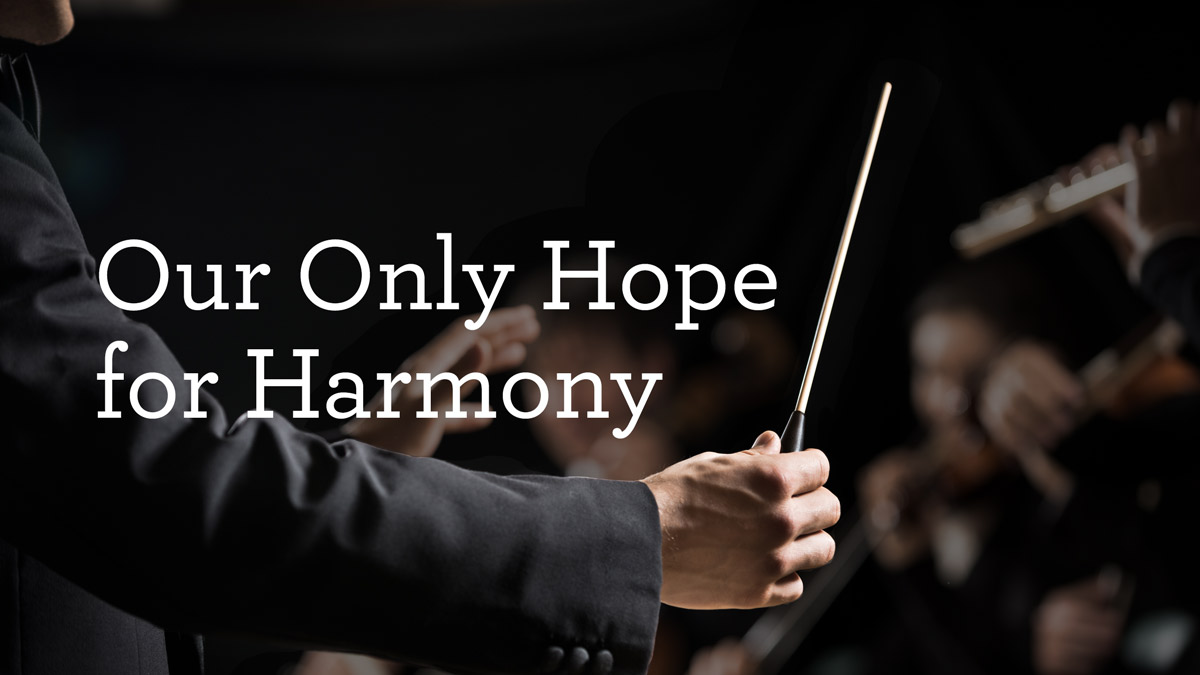
By all accounts, the Cleveland Orchestra is one of the finest symphony orchestras in America—indeed, even in the world. Founded in 1918, the orchestra’s music has amazed listeners and impressed the toughest critics across the globe for over a century.
What would happen to such a world-renowned group without their conductor at the helm? Surely, each musician is more than capable on their own, but were the conductor deposed in a musical coup, all the harmony that could have resulted from submitting to the score and bowing under the baton of the conductor would be forfeited.
Our world is like an orchestra that has deposed its Conductor. We have been created by God and for God, and He intends us to live under His sovereign direction. Yet we have been separated from God, and we have been scattered in the imagination of our hearts. By nature, we resolve ourselves to play whatever tune we like, shunning the very Conductor who desires to bring us into harmony with Himself and one another.
At the beginning of this decade, the pandemic, economic strain, and racial prejudice have all collided to amplify our discord. Fear has gripped our nation and our world, and the demonstrations that came in the aftermath of George Floyd’s unspeakably brutal and cruel death have highlighted our deep brokenness.
Every pundit has his or her ideas about what will heal our fractures and bring harmony to our society. But what matters most in such tense times as these is that we look to the Conductor. He alone has the hope we so desperately need.
Injustice Abounding
In times of wanton injustice, people often turn to Micah 6:8 to point out what God expects. Certainly, it is a fitting text for recent history, but if we wish to understand it as fully as we ought, we first must consider the passage in its context.
God wants His people to know and understand themselves as recipients of His unrelenting grace and mercy.
In the book of Micah, God indicts His people through His prophet. They have degenerated to the point that they “devise wickedness and work evil on their beds.” They can’t wait to get up in the morning to “perform it” (2:1). Clearly, Israel is in rough shape. In the third chapter, Micah even likens Israel’s rulers to cannibals who “chop [others] up like meat in a pot, like flesh in a cauldron” (3:3).
Nevertheless, by the time the reader arrives at chapter 6, the Lord’s tone is one of entreaty. Twice in verses 3–5 we read the opening phrase “O my people.” Perhaps there is even a hint of tenderness. God then calls His people to remember and know “the righteous acts of the LORD” (v. 5), giving them a little reminder of history: their redemption from Egypt and the righteous leaders He raised up (v. 4), how He providentially turned curses to blessing with Balak and Balaam at Shittim, and how He led the nation through the Jordan River to Gilgal (v. 5). This isn’t merely a history lesson; God wants His people to know and understand themselves as recipients of His unrelenting grace and mercy.
Verses 6–7 then describe an array of sacrifices from the would-be worshipper. But these sacrifices don’t cut it with God. We see this in parallel in 1 Samuel 15:22, when Samuel confronts Saul: “Has the LORD as great delight in burnt offerings and sacrifices, as in obeying the voice of the LORD? Behold, to obey is better than sacrifice, and to listen than the fat of rams.” God is not saying that sacrifices or other expressions of devotion are irrelevant; rather, He is looking for genuine obedience from the heart.
What God Requires
With that context in place, we are now better positioned to understand the famous verse in question, Micah 6:8: “He has told you, O man, what is good; and what does the LORD require of you but to do justice, and to love kindness, and to walk humbly with your God?” First, we will look at the three exhortations here, and then we will examine three cautions regarding their application.
1. Do justice.
For the original recipients, to “do justice” was at the very least a call to act in such a way as to reverse all the evil taking place. It meant doing justly in accord with the will and purpose of God as He had manifested it and revealed it to them in Scripture.
For example, in Deuteronomy 10:18, Moses says that God “executes justice for the fatherless and the widow, and loves the sojourner, giving him food and clothing.” So within the framework of God’s revelation of Himself, we want to take these things seriously—perhaps far more seriously than we have to this point in our lives. Surely James had Deuteronomy in mind when he wrote, “Religion that is pure and undefiled before God the Father is this: to visit orphans and widows in their affliction, and to keep oneself unstained from the world” (James 1:27).
In short, we might say that this command to “do justice” is the inevitable fulfillment of our Lord’s command to love our neighbors as we love ourselves (Matt. 22:39; Mark 12:31; Luke 10:27; see also Lev. 19:18; Matt. 19:19; Rom. 13:9; Gal. 5:14; James 2:8).
2. Love kindness.
If doing justice is the action, then loving kindness, or loving “mercy” (KJV, NIV), is the attitude of the heart. This is warm-hearted compassion. God calls His people to correct injustice and promote righteousness not as a grudging performance of duty but as a glad action. As we see so clearly in the New Testament, love “rejoices with the truth” (1 Cor. 13:6, emphasis added), and God Himself loves cheerful generosity (2 Cor. 9:7).
Unless we delight to share with others the pardon, love, and compassion our heavenly Father has granted us, how can we claim to truly know God?
Unless we delight to share with others the pardon, love, and compassion our heavenly Father has granted us, how can we claim to truly know God? (See 1 John 2:9–11; 3:10–18; 4:20.)
3. Walk humbly.
Finally, the call to “walk humbly” is an exhortation to live in submission to God’s will. Romans 12:1 is a New Testament equivalent: “Present your bodies as a living sacrifice, holy and acceptable to God, which is your spiritual worship.” The call is to think and feel and act in such a way as to love and honor the Lord. Our lives must align with how great God is and how mightily He has acted on our behalf.
Helpless without the Gospel
By the time we arrive at what God requires in verse 8, it’s all too easy for us to neglect the call in verse 5 to remember and know what the Lord has done. But unless we ourselves have come to know the steadfast love of the Lord, we have no hope to rightly dispense it to others, and we can neither do justice nor love kindness nor walk humbly with God.
1. We cannot do justice without the Gospel.
Often, people attempt to obey Micah 6:8 without the Gospel, using the verse as a sort of clarion call for people to help one another. Certainly, it is a good common grace when people help one another, but in the end, this is just a display of natural virtue. In some cases, the use of this verse can even devolve to the claim that God somehow owes us: “A good God, if He exists, will reward nice people if they do their best to treat others justly.”
The fact is that the Gospel of our Lord Jesus Christ is the ultimate display of God’s justice. (See Rom. 1:16–17; 3:25–26.) And unless we are united to Christ by faith in the Gospel, then all our attempts at doing justice “are as filthy rags” (Isa. 64:6 KJV).
2. We cannot love kindness apart from the Gospel.
Often, the message of Micah 6:8 sometimes replaces the Gospel. Instead of heralding “Christ and him crucified” (1 Cor. 2:2), we sound a message of generic love and goodwill. Now, again, we should take no issue with people—believers and unbelievers alike—loving one another insofar as they are able. But the Scriptures call us to more than just good feelings.
The apostle Paul puts it this way: “The aim of our charge is love that issues form a pure heart and a good conscience and a sincere faith” (1 Tim. 1:5, emphasis added). Pure love issues only from a pure source, and that source must be a heart made new by the transforming power of the Gospel. Apart from the Gospel, we have no hope to genuinely love kindness and mercy.
3. We cannot walk with the Lord absent the Gospel.
It should be obvious to us by this point, but we cannot walk with God except by means of the Gospel. “Our fellowship is with the Father and with his Son Jesus Christ,” says the apostle John (1 John 1:3, emphasis added). Or as Jesus Himself put it, “No one comes to the Father except through me” (John 14:6).
The Gospel of our Lord Jesus Christ is the ultimate display of God’s justice.
People have all sorts of notions about God and what He is like, but the testimony of Scripture is plain: unless you know Jesus Christ, you do not know God, and you cannot walk with Him.
Our Only Hope
People have all sorts of notions about God and what He is like, but the testimony of Scripture is plain: unless you know Jesus Christ, you do not know God, and you cannot walk with Him.
So what is our only hope for harmony? The answer is not in our own attempts at living justly but in “the righteous acts of the LORD” (Micah 6:5). To every Christian, God has demonstrated His righteousness most clearly in the Gospel. Indeed, God has shown each and every one of us what is good—namely, the Lord Jesus Christ and His mission “to reconcile to himself all things” (Col. 1:20).
We will never fix the world. We can never restore harmony. Only the Conductor can cause His world and everything in it to live at peace and to reverberate with beauty and euphony. But until God chooses to fully restore order and harmony, we can all pledge, by the power of the Spirit, to live in a manner worthy of the Gospel by doing justice, loving kindness, and walking humbly in our spheres of influence, however great or small.
This article has been adapted from the sermon “What God Requires” by Alistair Begg.
Topics: Articles
